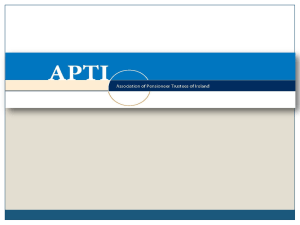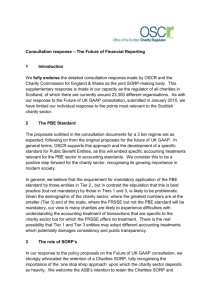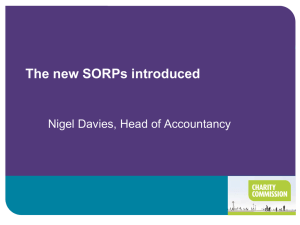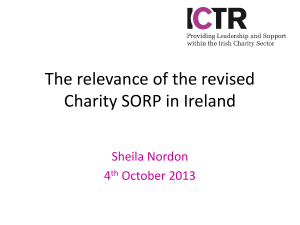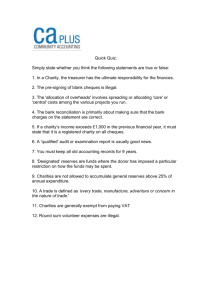- Charities SORP
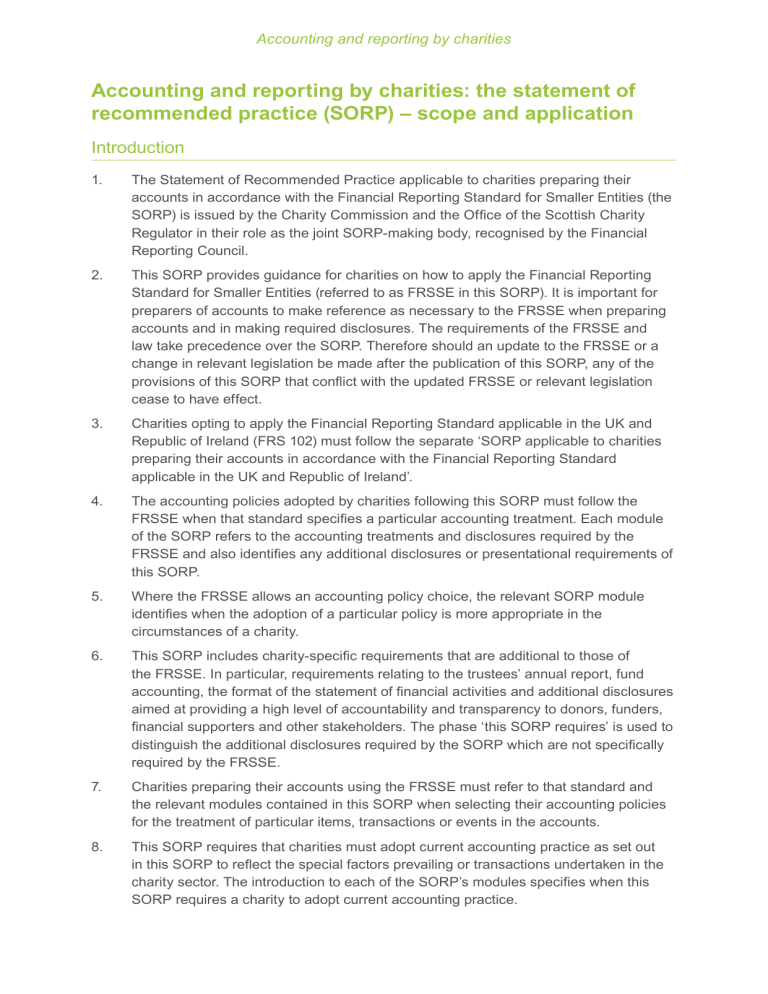
Accounting and reporting by charities
Accounting and reporting by charities: the statement of recommended practice (SORP) – scope and application
Introduction
1. The Statement of Recommended Practice applicable to charities preparing their accounts in accordance with the Financial Reporting Standard for Smaller Entities (the
SORP) is issued by the Charity Commission and the Office of the Scottish Charity
Regulator in their role as the joint SORP-making body, recognised by the Financial
Reporting Council.
2. This SORP provides guidance for charities on how to apply the Financial Reporting
Standard for Smaller Entities (referred to as FRSSE in this SORP). It is important for preparers of accounts to make reference as necessary to the FRSSE when preparing accounts and in making required disclosures. The requirements of the FRSSE and law take precedence over the SORP. Therefore should an update to the FRSSE or a change in relevant legislation be made after the publication of this SORP, any of the provisions of this SORP that conflict with the updated FRSSE or relevant legislation cease to have effect.
3. Charities opting to apply the Financial Reporting Standard applicable in the UK and
Republic of Ireland (FRS 102) must follow the separate ‘SORP applicable to charities preparing their accounts in accordance with the Financial Reporting Standard applicable in the UK and Republic of Ireland’.
4. The accounting policies adopted by charities following this SORP must follow the
FRSSE when that standard specifies a particular accounting treatment. Each module of the SORP refers to the accounting treatments and disclosures required by the
FRSSE and also identifies any additional disclosures or presentational requirements of this SORP.
5. Where the FRSSE allows an accounting policy choice, the relevant SORP module identifies when the adoption of a particular policy is more appropriate in the circumstances of a charity.
6. This SORP includes charity-specific requirements that are additional to those of the FRSSE. In particular, requirements relating to the trustees’ annual report, fund accounting, the format of the statement of financial activities and additional disclosures aimed at providing a high level of accountability and transparency to donors, funders, financial supporters and other stakeholders. The phase ‘this SORP requires’ is used to distinguish the additional disclosures required by the SORP which are not specifically required by the FRSSE.
7. Charities preparing their accounts using the FRSSE must refer to that standard and the relevant modules contained in this SORP when selecting their accounting policies for the treatment of particular items, transactions or events in the accounts.
8. This SORP requires that charities must adopt current accounting practice as set out in this SORP to reflect the special factors prevailing or transactions undertaken in the charity sector. The introduction to each of the SORP’s modules specifies when this
SORP requires a charity to adopt current accounting practice.
Accounting and reporting by charities
9. For all other transactions that are not specifically dealt with in the FRSSE, charities may follow their existing accounting policies provided that the policy and related disclosures made are consistent with accepted accounting practice. Where a charity undertakes a new transaction for which it has no existing policy and where it is not dealt with in the FRSSE, the FRSSE requires a charity to have regard to current practice in developing its accounting policies.
10. Where a charity undertakes a new transaction for which it has no policy and where it is not dealt with in the FRSSE or this SORP, the FRSSE requires a charity to have regard to FRS 102 in establishing current practice.
11. Before applying this SORP, the following sections should be read which explain the scope and application of this SORP:
•
•
the effective date of commencement;
•
the intended user of the SORP;
•
•
the intended user of the trustees’ annual report and accounts;
•
•
use of the terms ‘must’, ‘should’ and ‘may’;
and also provides:
• an index of the SORP modules; and
• the assurance statement given by the Financial Reporting Council
Scope of the SORP
12. All charities preparing accruals accounts in the UK in accordance with the FRSSE must follow the recommendations of this SORP unless an alternative reporting framework or another SORP applies. In the Republic of Ireland, charities established as public guarantee companies are not eligible to apply the FRSSE and therefore should not apply this SORP. For all other charities established in the Republic of
Ireland, whilst the application of this SORP is not a legal requirement, it should be referred to as best practice guidance that will be relevant to ensuring a charity’s accounts give a ‘true and fair’ view.
13. This SORP must only be used by charities that are eligible and choose to apply the
FRSSE. In the UK, a charity must meet the size criteria that define a small company or small group under the Companies Act 2006. These same thresholds apply to all charities whether or not established as a company. In the Republic of Ireland, noncompanies may use the FRSSE and this SORP provided they would, if established as a company, meet the size criteria for a small company set by relevant regulations.
Accounting and reporting by charities
14. The thresholds that define a small company and a small group are set out in Appendix
3 of this SORP. A charity is also excluded from adopting the FRSSE if it, or a member of its group, undertakes certain insurance, banking or financial service activities.
Charities must refer to paragraph 9 of the FRSSE to ensure they do not fall within the category of entities excluded from adopting the FRSSE.
15. In addition, charities must also meet any conditions imposed by this SORP for adopting the FRSSE. In particular, an eligible charity may only adopt the FRSSE when preparing its accounts provided that it does so in conjunction with the recommendations of this SORP.
16. In addition, where a separate SORP exists for a particular class of charities (for example SORPs applicable to Registered Social Housing Providers or to Further and
Higher Education Institutions, or Common Investment Funds), those charities should adhere to that SORP which may scope out the option of applying the FRSSE.
17. Charities applying this SORP may also be subject to specific regulations or legal requirements based on how they are constituted or their jurisdiction(s) of formation, operation or registration. For example, charities constituted as companies will need to meet the reporting requirements of company law. Whilst this SORP has been prepared to be consistent with the requirements of company and other relevant law and regulation, charities will need to ensure that any particular accounting requirements and disclosures applicable to them are also met.
18. The accounting recommendations of this SORP do not apply to charities preparing cash-based receipts and payments accounts. Charities preparing cash-based accounts must refer to the regulatory requirements of their jurisdiction(s) of registration regarding the format and content requirements for receipts and payments accounts and the trustees’ annual report.
19. Charities not eligible to, or choosing not to, prepare their accounts under the FRSSE must prepare their accounts under FRS 102 and also use the FRS 102 SORP.
Effective date of commencement
20. This SORP is applicable to the accounts of relevant charities for reporting periods beginning on or after 1 January 2015. In those jurisdictions where the applicable
SORP is specified in regulations, this SORP cannot be adopted until the applicable regulations are made allowing its application.
The intended user of the SORP
21. The SORP is developed primarily to assist those involved in the preparation of the accounts and trustees’ annual report of a charity. The SORP is also relevant to charity auditors, independent examiners and accountancy practitioners who are involved in the scrutiny of charity accounts or in advising on the application of accounting standards in the context of charities.
22. It is anticipated that users of this SORP will be familiar with accounting concepts, principles and terminology and possess a reasonable knowledge of accepted and current accounting practice.
Accounting and reporting by charities
Objectives of the SORP
23. The recommendations of the SORP are intended to achieve the following objectives:
• improve the quality of financial reporting by charities;
• enhance the relevance, comparability and understandability of the information presented in charity accounts;
• provide clarification, explanation and interpretation of accounting standards and their application to charities and to sector specific transactions; and
• assist those who are responsible for the preparation of the trustees’ annual report and accounts.
The intended user of the trustees’ annual report and accounts
24. The objective of the trustees’ annual report (the report) and accounts is to provide information about a charity’s financial performance and financial position that will be useful to a wide range of stakeholders in assessing the trustees’ stewardship and management of charitable funds, and to assist the user of the accounts to make economic decisions in relation to the charity.
25. Although past, current and potential funders, donors and financial supporters of a charity are the primary audience for the financial information contained in a charity’s report and accounts, the preparer should also be aware that interest in this information may also extend to a charity’s service users and other beneficiaries.
26. The report and accounts should not be viewed simply as a statutory requirement or a technical exercise. The report and accounts, when read together, should help users of the information to understand what the charity is set up to do, the resources available to it, how these resources have been used and what has been achieved as a result of its activities.
How to use the modular SORP
27. For a charity to state that it has prepared its accounts in accordance with this SORP, it must adhere to the SORP’s requirements for the preparation of both the accounts and the trustees’ annual report.
28. The accounts of a charity comprise the following:
• A statement of financial activities (SoFA) which provides an analysis of a charity’s income and expenditure and movement in funds in the reporting period.
• A balance sheet which sets out a charity’s assets and liabilities and retained funds at the end of the reporting period.
• For charities that are companies, an income and expenditure account included either within the SoFA, or as a separate summary income and expenditure account in addition to the SoFA where necessary to meet the reporting requirements of company law.
Accounting and reporting by charities
• Notes to the accounts that explain the accounting policies, provide more details of how the income and expenditure is made up, and provide extra information about particular assets and liabilities, or about particular funds or transactions; and
• an optional cash flow statement.
29. The SORP has a number of core modules to which all charities must refer when preparing their accounts and trustees’ annual report. Supplementing these core modules, there are additional modules that apply only when a charity:
• undertakes a specific type of transaction;
• needs to recognise, measure or disclose a specific asset or liability in a particular way;
• has particular forms of investment; or
• adopts a particular legal form or group structure.
30. When preparing their accounts, charities must refer to the index of modules to ensure that they identify all of the SORP’s recommendations that apply to their transactions, assets and liabilities. This should be done for each reporting period and whenever a charity undertakes a new type of transaction. In particular, charities must select those modules that apply to their specific transactions and circumstances.
31. This SORP provides guidance to charities on the application of the FRSSE and also provides recommendations on accounting and reporting of charity-specific transactions that are not addressed within the FRSSE.
32. The SORP also offers advice on how a charity may disclose particular issues and provides examples or suggested layouts of particular notes which a charity may choose to follow.
33. See the SORP module ‘ Accounting standards, policies, concepts and principles, including the adjustment of estimates and errors ’ for details of the SORP compliance statement that a charity must provide within its accounting policy note and the additional disclosures that it must make in the event of a departure from the
SORP’s provisions.
Use of the terms ‘must’, ‘should’ and ‘may’
34. This SORP uses different terms to distinguish those requirements that must be followed in order to comply with the SORP from other recommendations which charities can opt to follow when preparing the trustees’ annual report and accounts.
35. This SORP uses the term ‘must’ to indicate those elements that are important to the reader of the trustees’ annual report that must be included within the report or to identify particular accounting treatments, disclosures or presentational requirements that are likely to affect the ability of the accounts to give a true and fair view if not applied to material transactions or items. Where this SORP states that a recommendation is one which must be followed, non-adherence to that recommendation is a departure from this SORP.
Accounting and reporting by charities
36. This SORP uses the term ‘should’ for an item in the trustees’ annual report or the accounts for those recommendations aimed at advancing standards of financial reporting as a matter of good practice. While charities are encouraged to follow all the
SORP’s recommendations, a failure to follow a ‘should’ recommendation with respect to the report or the accounts is not regarded as a departure from this SORP.
37. This SORP uses the term ‘may’ for an item in the trustees’ annual report or an approach to a particular disclosure that a charity may choose to adopt or identifies that an alternative accounting treatment or disclosure of a transaction or event is allowed by the SORP. Charities may choose whether such examples or alternative treatments are adopted at their discretion.
